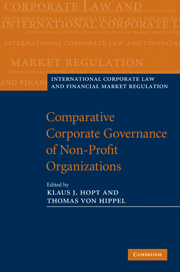Book contents
- Frontmatter
- Contents
- List of contributors
- Preface
- Abbreviations
- PART I Economic findings and theories on nonprofit organizations
- PART II The nonprofit sector: private law, trust law, tax law in selected countries
- 4 Anglo-American countries
- 5 Germanic countries
- 6 Romanic countries
- 7 Transformation countries
- 7.1 Nonprofit organizations in Hungary
- 7.2 Nonprofit organizations in the Czech Republic
- 7.3 Nonprofit organizations in the People's Republic of China
- PART III The board of nonprofit organizations
- PART IV Good governance of nonprofit organizations: activities and regulatory problems
- PART V Good governance of nonprofit organizations: self-regulation, disclosure and supervision
- Index
7.2 - Nonprofit organizations in the Czech Republic
from 7 - Transformation countries
Published online by Cambridge University Press: 05 August 2011
- Frontmatter
- Contents
- List of contributors
- Preface
- Abbreviations
- PART I Economic findings and theories on nonprofit organizations
- PART II The nonprofit sector: private law, trust law, tax law in selected countries
- 4 Anglo-American countries
- 5 Germanic countries
- 6 Romanic countries
- 7 Transformation countries
- 7.1 Nonprofit organizations in Hungary
- 7.2 Nonprofit organizations in the Czech Republic
- 7.3 Nonprofit organizations in the People's Republic of China
- PART III The board of nonprofit organizations
- PART IV Good governance of nonprofit organizations: activities and regulatory problems
- PART V Good governance of nonprofit organizations: self-regulation, disclosure and supervision
- Index
Summary
Introduction
The term “nonprofit organisations”
The legal order in the Czech Republic does not contain the legal definition of the “nonprofit organisation”, and this term has no specific legal meaning. In the common use, nonprofit organisations are subjects of private law existing for some purpose other than profit-making.
These entities have several characteristics. They are either person-based or property-based, are typically founded by means of a multi- or unilateral civil law act, exert activities for the public or mutual benefit, are separate from the state, have a voluntary nature and a certain organisational structure. Moreover, they are equipped with certain mechanisms enabling the control of their own activities, make use of a particular type of financing (including certain tax benefits) and often utilise the work of volunteers.
Their most important characteristic is the fact that they do not distribute their profit, but use it for public benefit or mutual benefit purposes.
Czech law is, technically, a part of the German legal family. It has developed from Austrian law, having been strongly influenced by Roman law and displaying many similarities to the traditional German legal conception.
This traditional conception was, however, significantly disrupted during the process of the so-called “socialist re-codification of private law”, carried out primarily in the 1960s. Under this process, civil law came closer to the Soviet doctrine and was fragmented into various branches of law regulated by an immense number of laws.
- Type
- Chapter
- Information
- Comparative Corporate Governance of Non-Profit Organizations , pp. 379 - 427Publisher: Cambridge University PressPrint publication year: 2010

